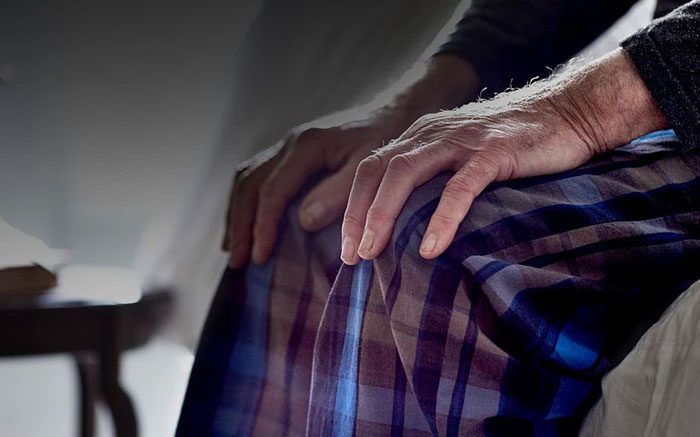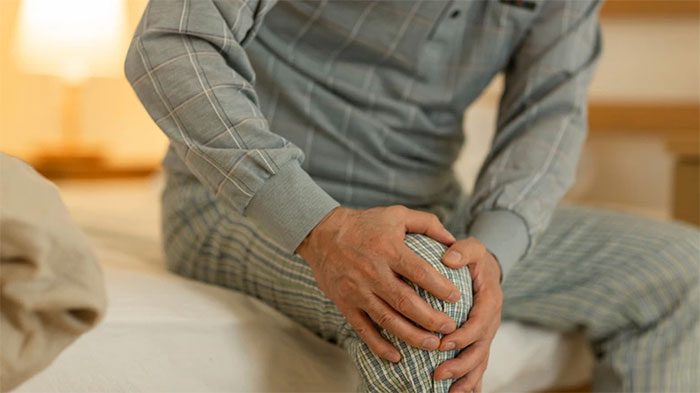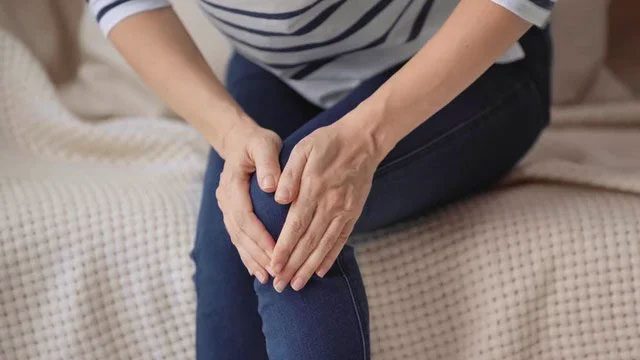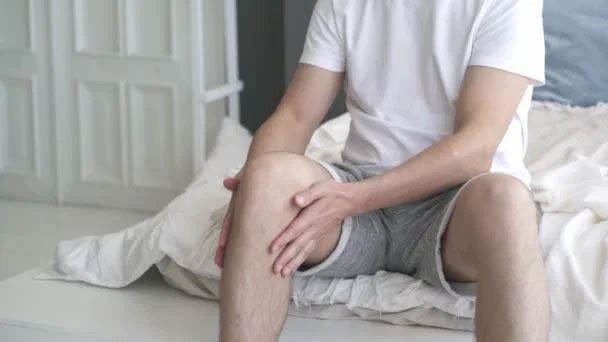Knee pain at night can stem from various causes such as injuries, arthritis, bursitis, and gout. The discomfort from knee pain while trying to sleep not only disrupts your rest but can also lead to insomnia due to pain, resulting in daytime fatigue.
Knee Pain at Night: Causes, Symptoms, and Treatment
1. Causes of Knee Pain at Night
The causes of knee pain at night include:
Osteoarthritis
In osteoarthritis, the soft tissues in the knee wear down, causing the knee bones to rub against each other, leading to irritation, inflammation, and pain.
The pain from osteoarthritis can flare up, and you may experience stiffness or pain when bending your knee or standing. Swelling and sharp pain are also common symptoms that tend to be more pronounced at night.
Rheumatoid Arthritis
Rheumatoid arthritis (RA) is a chronic autoimmune disease that affects multiple joints throughout the body, including the knees.
In rheumatoid arthritis, the synovial membrane covering the knee joint becomes inflamed. This leads to knee pain and joint stiffness.

Rheumatoid arthritis can lead to knee pain. (Image: Internet).
Post-Traumatic Arthritis
This condition develops after a knee injury. For instance, a fracture can damage the joint surface. Meniscus tears and ligament injuries can lead to arthritis many years after the injury. It can also occur due to degenerative changes (wear and tear associated with aging).
The pain from post-traumatic arthritis is similar to osteoarthritis pain and often includes symptoms of stiffness and swelling. Individuals may experience more pain with weather changes or during prolonged periods of rest, such as sleeping at night.
Bursitis
Bursitis can cause swelling and pain around the kneecap or on one side of the knee. In bursitis, the fluid sacs in the knee become irritated and swollen, putting pressure on adjacent areas of the knee, causing pain.
The most common cause of bursitis is excessive pressure on the knee, such as kneeling or squatting without wearing knee pads or braces for support. Sometimes, the bursa can become inflamed after a bump to the knee due to an injury.
Gout
Gout is a form of arthritis that causes intense pain, swelling, redness, and warmth upon touch. It typically affects the big toe but can develop in any joint, including the knee. When the body has high levels of uric acid, sharp crystals form in the joints, causing sudden pain, swelling, and aching.

Gout often affects the toes but can impact any joint. (Image: Internet).
Patellar Tendonitis
This is a common condition among athletes that causes knee pain. It is often caused by overexertion, weak thigh muscles, or gait issues—such as over-pronating while walking or running.
Injuries and Other Conditions
As the largest joint in the body, the knee is prone to injuries and strain. If you fall or bump your knee, you may experience pain due to bruising. If any of the three bones in the knee are fractured, you may feel weakness and sharp pain.
2. Why is Knee Pain Worse at Night?
Typically, knee pain tends to worsen at night due to:
– You are Relaxing: When your mind is busy, you often do not notice the pain you are experiencing. Therefore, when you relax, you may become more aware of pain ranging from mild to moderate.
Moreover, when you are trying to sleep, your body has less cortisol to reduce swelling and irritation in the knee. Cortisol can help your body manage inflammation, thereby reducing joint pain. However, cortisol is produced more when you are in deep sleep.
– Your Body is Inactive: Lying down for hours can cause your joints to feel stiff and less mobile, causing the muscles and tissues around the knee joint to tighten and create pain.
– Lack of Sleep: You may easily get caught in a cycle of insomnia due to knee pain, leading to sleep deprivation. Lack of sleep can actually exacerbate your pain. Sleep is crucial for healing and rejuvenation. Without it, you will have less energy to devote to recovery as you need to focus on bodily processes to stay alert.
If nighttime knee pain keeps you tossing and turning, you may inadvertently put additional strain on your knee by sleeping in an uncomfortable position.

Nighttime is a period of inactivity, leading to stiffer joints and more pain. (Image: Internet).
3. Ways to Relieve Knee Pain at Night
Here are some tips to help alleviate knee pain at night for better sleep:
Heat or Cold Therapy
This method can help control pain and inflammation. You can try:
+ Applying a heating pad or ice pack for 15 to 20 minutes before bed. If you have chronic knee pain, you might also consider alternating between heat and cold. Start with heat to increase blood flow and help reduce initial pain, followed by ice to prevent swelling in the area around the joint.
Remember to wrap the ice pack in a towel to avoid damaging your skin.
+ Using a hot water bottle at night. If pain strikes and wakes you up, grab a hot water bottle for relief.
Warm Baths Before Bed
Before bed, you might take a warm bath. This will help improve blood flow and relieve knee pain by relaxing tight muscles. For an even more relaxing experience, consider adding bath salts or essential oils to the water.
However, be sure to bathe in a draft-free room, and keep your body warm afterward, especially on cold days.
Knee Massage
Massaging your knee before bed can help relieve pain. This technique improves blood flow and warms the painful area, helping to reduce discomfort. To make knee massage more comfortable, first apply lotion or oil. If you feel pain or discomfort, you should stop.

Gentle knee massage will help joints become more flexible and effectively reduce pain. (Image: Internet)
Choosing a Good Sleeping Position
When experiencing knee pain, you should use a pillow for support to reduce pressure on the knee. If you sleep on your back, you can place a pillow under your knee; if you sleep on your side, you can place a pillow between your knees.
Medication Use
Sometimes natural remedies may not suffice for knee pain relief, especially for those with severe conditions. To alleviate pain, you might need to take pain relievers. Common NSAIDs include Advil, Motrin, and Aleve.
Medications treating specific conditions, such as gout and rheumatoid arthritis, can also help reduce knee pain over time.
In particular, individuals with knee pain should avoid excessive napping, caffeine, or using phones before bed. This can hinder your ability to fall asleep and exacerbate pain.
It’s advisable to keep your room cool, relax by listening to music, to help you fall asleep faster, and minimize the perception of pain due to being alert.
4. How to Prevent Severe Knee Pain at Night
Certain activities can exacerbate knee pain, resulting in discomfort that lasts into the night. Here are some measures individuals can take to prevent severe knee pain during nighttime:
- Avoid carrying excessively heavy objects
- Perform regular stretching, especially before and after exercising
- Wear appropriate footwear
- Exercise correctly. For example, instead of running on a treadmill, consider using a stationary bike or elliptical machine to reduce stress on the joints.
- Allow your knees to rest as needed throughout the day
- Use a knee compression wrap
- Utilize crutches or other mobility aids if necessary, especially if you have an injury or serious condition.
- Avoid overusing your knees
- Try to limit walking up and down stairs
- Maintain a healthy weight. Reducing body weight to a moderate level can help decrease the stress placed on your joints.
Overall, nighttime knee pain significantly impacts the lives of those affected. Prolonged episodes can lead to insomnia and various other health issues. If your knee pain worsens and does not improve, you should visit a hospital for an examination and appropriate treatment plan.



















































